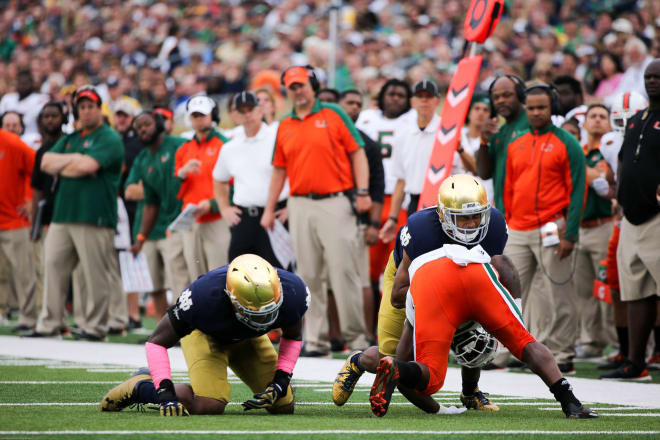Notre Dame’s Four Rookie DBs Continue To Perform Impressively

During Saturday’s 30-27 victory over Miami, Notre Dame’s defense performed much better than the score might indicate.
• The first Miami touchdown was only a 38-yard drive after a special teams snafu, and its last TD came on a fumbled punt that fell into Notre Dame’s end zone and was recovered by the Hurricanes.
• The 12 tackles for loss recorded by the Irish defense were the most in a game since head coach Charlie Weis’ debut season in 2005. Meanwhile, the five quarterback sacks were the most since recording six in the 37-34 win versus Arizona State in 2013.
• While Miami repeatedly challenged Notre Dame’s young secondary vertically down the field in 42 pass attempts, it did not record one “explosive” play, which is defined as a gain of 25 or more yards.
The latter is especially notable because of the six Notre Dame players who lined up in the secondary, four were true freshmen: free safety Devin Studstill, and cornerbacks Troy Pride Jr., Julian Love and Donte Vaughn.
Studstill played 75 of the possible 77 snaps on defense with fellow safety and junior Drue Tranquill. Pride Jr. led the corners with 63 snaps, while Love had 54 and Vaughn 32.
What was especially notable was Vaughn had three passes broken up when challenged deep. No Irish defensive back entered the Miami game with more than two passes broken up, so to have three in one contest is rare. However, the rangy 6-2 Vaughn’s ball skills have been evident ever since his interception on textbook coverage near the Irish end zone versus Duke Sept. 24.
“Julian was tested as well,” head coach Brian Kelly pointed out. “He had two pass break-ups [although the official stat sheet had him with only one], and they were all on vertical routes. They both play the ball well down the field, they were both tested, because that was the game plan.”
According to Kelly, Miami this year had been mainly a more conservative passing team while running primarily curl or flat routes. However, with the combination of the youth in Notre Dame’s secondary, plenty of speed at receiver and a potential top-round pick at quarterback in Brad Kaaya, the Hurricanes wanted to test the green Irish defensive backfield.
“They wanted to push the ball down the field and [our freshmen] were up to the challenge,” Kelly said. “When you see three freshmen corners, I think your first thought is, ‘Let's push the ball down the field,’ and they all did a very good job.”
Allowing the freshmen to use their skills to the maximum and thrive is a less complex defensive scheme implemented by Kelly and now acting coordinator Greg Hudson that doesn’t employ too much variation in coverages or assignments.
“You’re certainly playing a lot more man coverage and you just have to be a little bit more disciplined,” Kelly said. “I think that these kids have shown some really good discipline. Miami tried to throw the ball every which way they could down the field and the best they could muster was 24 yards in terms of an explosive play.”
Finally, nothing is a greater friend to a secondary than excellent pass pressure up front. With the new defensive scheme since October, the Irish have continued to improve in that area as well. After recording one sack in four September games, Notre Dame had three versus Stanford Oct. 15 and five versus the Hurricanes. Fifth-year senior nose guard Jarron Jones earned the game ball with his six tackles for loss, but senior defensive end Isaac Rochell (a sack and one pass broken up) and sophomore defensive tackle Jerry Tillery (three QB hurries versus Miami) also made their presence felt.
Pass pressure and coverage skills all have to work as one to be successful as a unit.
“The ability to being on a body and contest the vertical throws were probably as key as anything,” Kelly said. “But keep in mind the pressure that we had up front at times forced the quarterback to get rid of the ball maybe a little bit quicker than he wanted to.
"So it was a combination of being in good position with our defensive backs and really getting very, very good pressure from our front four.”
The next two weeks will present a far different challenge for the quartet of freshmen defensive backs when they face a triple-option attack for the first time against Navy Nov. 5 and then Army Nov. 12.
“As long as they carry the same kind of eye discipline that they have shown over the past month, they should be able to do a good job against Navy and Army as well,” Kelly said.
At this point, it might no longer be a surprise, either.
----
• Talk about it inside Rockne’s Roundtable
• Subscribe to our podcast on iTunes
• Learn more about our print and digital publication, Blue & Gold Illustrated.
• Follow us on Twitter: @BGINews, @BGI_LouSomogyi, @BGI_CoachD,
@BGI_MattJones, @BGI_DMcKinney and @BGI_CoreyBodden.
• Like us on Facebook
